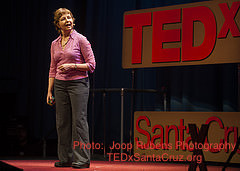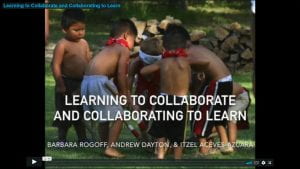VIDEOS
Developing Destinies: A Mayan Midwife and Town (2011)
A 6-minute video overview of Developing Destinies: A Mayan Midwife and Town (Oxford, 2011), with historical film clips and photos. Royalties are contributed to the Learning Center and other projects in the Guatemalan Maya town that is featured. If the video to the left does not work, use this link.
Have a look at related paintings and photos and reviews on the public Facebook page facebook.com/barbararogoffpublications and see a description of the book.
TEDx talk on children learning to collaborate (2015)
Barbara Rogoff's 8-minute TEDx talk based on her research on cultural aspects of how children learning to collaborate.
If the link via the image to the left does not work, use this link.
NSF video: Learning by Observing (2016)
Barbara Rogoff' and Maricela Correa's 3-minute video "Learning by Observing" draws attention to strengths for learning among Indigenous and Mexican-heritage children, who are skilled observers. The video was honored by NSF as the top public vote-getter and a top conversation-generator, of all 156 videos in NSF's Video Showcase 2016 https://stemforall2016.videohall.com/presentations/693
NSF video: Learning to Collaborate and Collaborating to Learn (2017)
NSF video: Learning by Helping (2018)
Collaboration as an ensemble (2019)
Mexican-heritage children’s ways of collaboration are strengths for learning, and can also serve as a model for thinking together, for children from other backgrounds. This video shows how pairs of Mexican-heritage US children collaborated twice as much in planning and in computer programming together, compared with European American middle-class children. The Mexican-heritage pairs often collaborated in fluid synchrony, without even having to discuss proposals for what to do next. Skillful collaboration is an important resource for learning, as people think together https://stemforall2019.videohall.com/presentations/1346
Learning by Observing and Pitching In -- LOPI Overview
Ed-Talk: Sophisticated collaboration (2016)
This 6-minute Ed-talk shows the sophisticated collaboration that Barbara Rogoff and her colleagues have found among many Mexican-heritage children.
Ed talk produced by invitation of the centennial of the American Education Research Association 2016. If the video to the left does not work, use this link.
Ways of Learning in Indigenous Communities of the Americas: Observing and Pitching In (2016)
Professor Barbara Rogoff, Ph.D. examines Indigenous children’s approach to learning and how educators can create a more supportive academic environment. In Seattle, 2016. If the video to the left does not work, use this link.
Learning How to Look & Listen with Barbara Rogoff and Andy Dayton (2017)
Barbara Rogoff and Andy Dayton look a 2-minute video of classroom interaction in the context of a conference hosted by Fred Erikson. If the video to the left does not work, use this link.
Professor Barbara Rogoff - Learning through Pitching In (2013)
As part of the UC Davis School of Education's Distinguished Educational Thinker Series, Barbara Rogoff, Distinguished Professor of Psychology at UC Santa Cruz, gave a talk at UC Davis titled "Learning through Pitching In." The 2012-13 Distinguished Educational Thinker Series at UC Davis is co-hosted by the School of Education, Graduate Group in Education and the School of Education Alumni Annual Fund. If the video to the left does not work, use this link.


